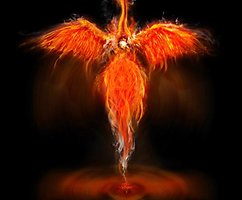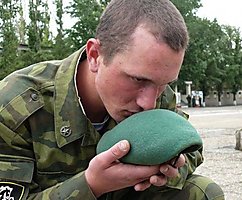Be respected, they were afraid, they dreamed to be like. an interesting story about the "Night Witches"
 Bashny.Net
Bashny.Net
The decision to create female air regiments was taken at the beginning of the Great Patriotic War. All the girls pilots immediately got a new nickname "Night Witches." Be respected, they were afraid, they dreamed to be like. an interesting story about the "Night Witches" under the cut!
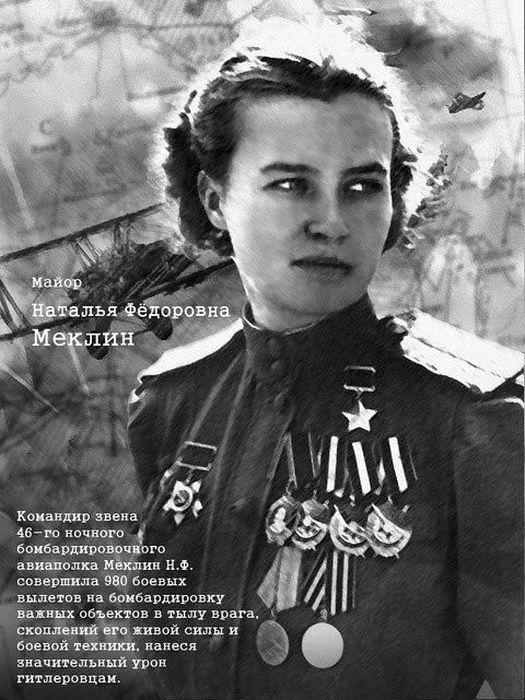
In 1941, the Soviet Union decided to create three air regiments consisting almost exclusively of women
During the Second World War, the main warring parties have used female pilots. In the United States was created paramilitary organization called "Women pilots serving in the Air Force» («Women Airforce Service Pilots» (WASP), consisting of nearly a thousand women. Its objective is to transfer aircraft from factories to military bases and ports of shipment, cargo and towing aerial targets during shooting practice defense.
In England, a similar problem is solved by the organization "Auxiliary Air Transport» («Air Transport Auxiliary» (ATA), which along with men have served more than 160 women. In Germany, aviatrix Hanna Reitsch ispytatelnitsa became famous after it was able to land the plane in the park Tiergarten during the assault on the capital of the Third Reich. But only in the Soviet Union, women pilots were in the combat units.
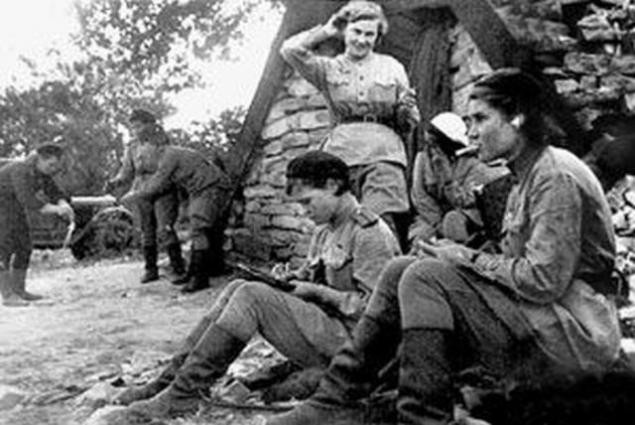
Already in 1917, Kerensky's Provisional Government gave permission for the establishment of several women's battalion to raise morale in the Russian army. One of them showed himself well at the front, and the other participated in the defense of the Winter Palace by the Bolsheviks during the October Revolution.
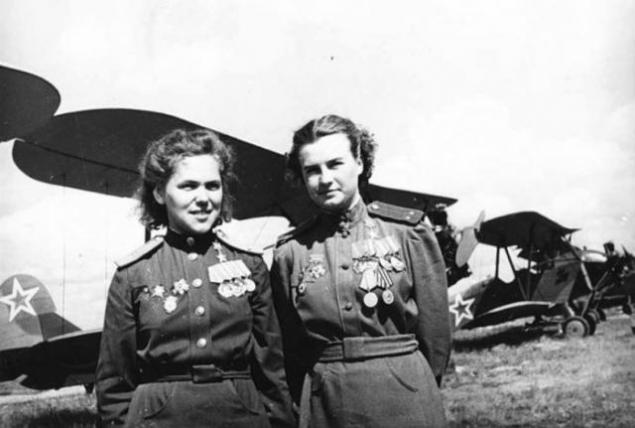
October 8, 1941, when German troops approached Moscow, Stalin ordered the creation of 122 aviation group. It was a temporary part, formed for the preparation and training of three air regiments, staffed exclusively by women, from pilots to ground staff (although during the war in the first two regiments still adopted a certain number of men). Initiated the creation of these regiments made famous Soviet aviator Marina Raskova. On Stalin's decision was also influenced by the lack of flight and promotional considerations.
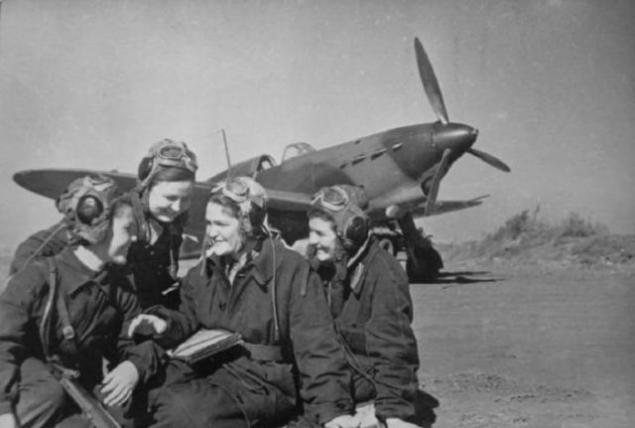
586 th Fighter Aviation Regiment first took part in the fighting in April 1942, first under the command of Tamara Kazarinova and then Alexander Gridneva. Its pilots have made 4419 sorties on the Yak-1, Yak-7 and Yak-9, knocking while 38 enemy vehicles.
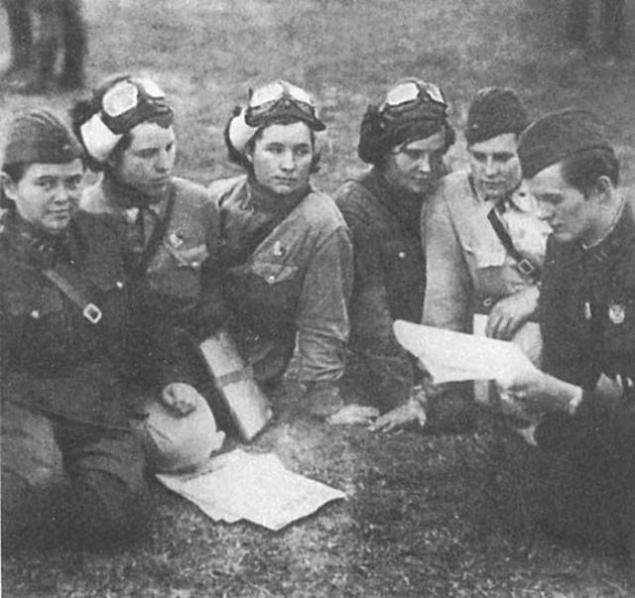
587-Bomber Aviation Regiment began to perform combat missions on the aircraft Po-2 in December 1942. They commanded Marina Raskova before his death in a plane crash in January 1943. After her command of the regiment took over Valentin Markov.
In September of the same year, for the exemplary performance of tasks, he was awarded the 125th Guards Bomber Regiment. Its pilots have made 1134 sorties, and five of them received the highest award of the country - the gold medal of the Hero of the Soviet Union.
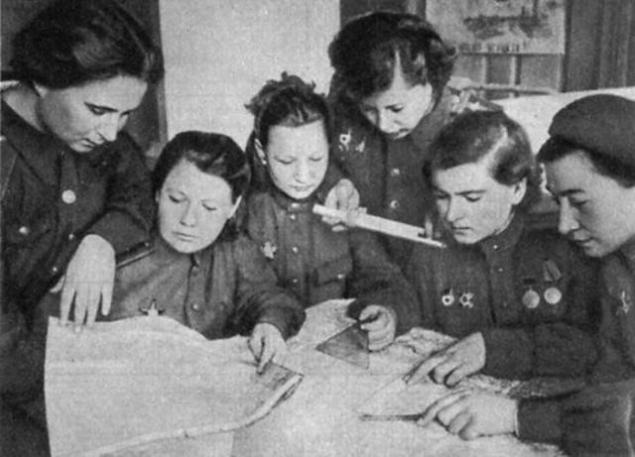
The most celebrated part was the 588 th Aviation Regiment legkobombardirovochny night, the only one that until the end of the war was staffed exclusively by women. For the first time he took part in the fighting in June 1942, performing under the command of Evdokia Bershanskaya more than 24 thousand sorties. In connection with the courage in combat missions, he was awarded the 588 th night legkobombardirovochny Guards Aviation Regiment. During the war, he lost 31 pilots (27% of staff), and the 24th was awarded the title Hero of the Soviet Union.
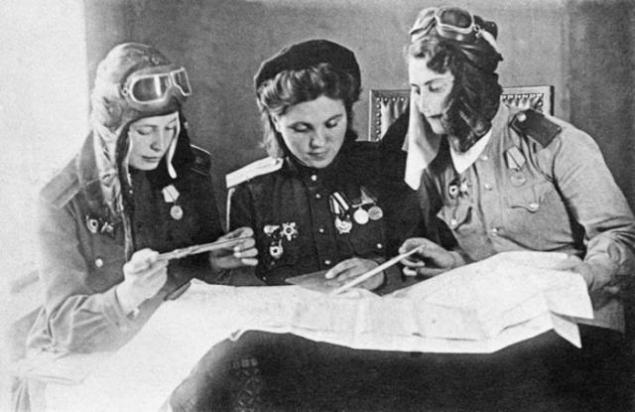
They flew a biplane Po-2, whose high maneuverability at low altitudes at low speed and high strength makes it very difficult struggle with it more speed and modern German aircraft. The Germans called Po-2 Nähmaschine (sewing machines) due to the characteristic noise of their engines. By nightfall, these aircraft to keep the enemy in constant tension.
Crews not until 1944 who took on board the parachutes to increase their bombs, carried out 15 sorties per night, guided by the compass and flares, which they ran for illumination purpose. Their attacks were more psychological than real effect. Plane approaching to the target at low level flight with the engine OFF. The only noise to warn of an imminent collision, which could be heard on the ground, there was a strange whistling wind published in contact with cables and skin of the aircraft.
Comparing this noise with a flying broom, the Germans began to call them Nachthexen (Night Witches).
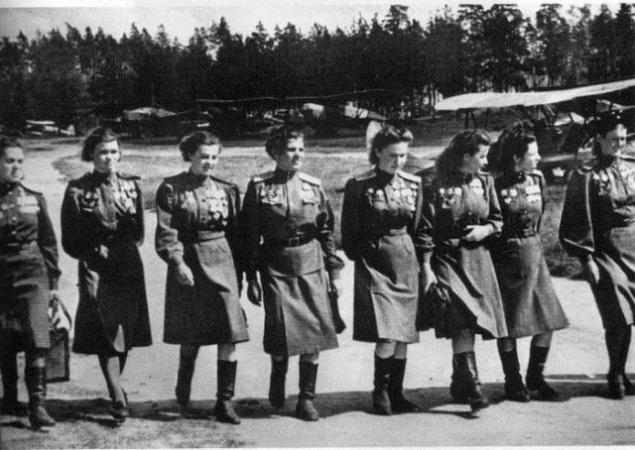
Hence

In 1941, the Soviet Union decided to create three air regiments consisting almost exclusively of women
During the Second World War, the main warring parties have used female pilots. In the United States was created paramilitary organization called "Women pilots serving in the Air Force» («Women Airforce Service Pilots» (WASP), consisting of nearly a thousand women. Its objective is to transfer aircraft from factories to military bases and ports of shipment, cargo and towing aerial targets during shooting practice defense.
In England, a similar problem is solved by the organization "Auxiliary Air Transport» («Air Transport Auxiliary» (ATA), which along with men have served more than 160 women. In Germany, aviatrix Hanna Reitsch ispytatelnitsa became famous after it was able to land the plane in the park Tiergarten during the assault on the capital of the Third Reich. But only in the Soviet Union, women pilots were in the combat units.

Already in 1917, Kerensky's Provisional Government gave permission for the establishment of several women's battalion to raise morale in the Russian army. One of them showed himself well at the front, and the other participated in the defense of the Winter Palace by the Bolsheviks during the October Revolution.

October 8, 1941, when German troops approached Moscow, Stalin ordered the creation of 122 aviation group. It was a temporary part, formed for the preparation and training of three air regiments, staffed exclusively by women, from pilots to ground staff (although during the war in the first two regiments still adopted a certain number of men). Initiated the creation of these regiments made famous Soviet aviator Marina Raskova. On Stalin's decision was also influenced by the lack of flight and promotional considerations.

586 th Fighter Aviation Regiment first took part in the fighting in April 1942, first under the command of Tamara Kazarinova and then Alexander Gridneva. Its pilots have made 4419 sorties on the Yak-1, Yak-7 and Yak-9, knocking while 38 enemy vehicles.

587-Bomber Aviation Regiment began to perform combat missions on the aircraft Po-2 in December 1942. They commanded Marina Raskova before his death in a plane crash in January 1943. After her command of the regiment took over Valentin Markov.
In September of the same year, for the exemplary performance of tasks, he was awarded the 125th Guards Bomber Regiment. Its pilots have made 1134 sorties, and five of them received the highest award of the country - the gold medal of the Hero of the Soviet Union.

The most celebrated part was the 588 th Aviation Regiment legkobombardirovochny night, the only one that until the end of the war was staffed exclusively by women. For the first time he took part in the fighting in June 1942, performing under the command of Evdokia Bershanskaya more than 24 thousand sorties. In connection with the courage in combat missions, he was awarded the 588 th night legkobombardirovochny Guards Aviation Regiment. During the war, he lost 31 pilots (27% of staff), and the 24th was awarded the title Hero of the Soviet Union.

They flew a biplane Po-2, whose high maneuverability at low altitudes at low speed and high strength makes it very difficult struggle with it more speed and modern German aircraft. The Germans called Po-2 Nähmaschine (sewing machines) due to the characteristic noise of their engines. By nightfall, these aircraft to keep the enemy in constant tension.
Crews not until 1944 who took on board the parachutes to increase their bombs, carried out 15 sorties per night, guided by the compass and flares, which they ran for illumination purpose. Their attacks were more psychological than real effect. Plane approaching to the target at low level flight with the engine OFF. The only noise to warn of an imminent collision, which could be heard on the ground, there was a strange whistling wind published in contact with cables and skin of the aircraft.
Comparing this noise with a flying broom, the Germans began to call them Nachthexen (Night Witches).

Hence
Tags
See also
They no longer exist
Lydia Litvyak
For that shot the designer Taubina (16 photos)
Overview ohotstvolov
Legendary "Klim Voroshilov" - War Machine
Bacchanalia calibers
Great comedians (7 pics + text)
Brest Fortress
Soviet Armed Forces (82 photos)
Heroes of the Great Patriotic War (29 photos)
